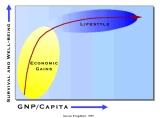 |
April 2011 - Volume 2, Issue 4
|
 |
| |
|
|
|
|
|
|
|
| From the Editor |
Rachel Smolker, Co-Managing Editor
The
disasters in Japan dominate our attention while people around the world
rightly reconsider nuclear power. So if you don't support nukes, coal,
or biomass power, then what do you support?
First
of all, let's accept that burning every single tree on the
continent--not recommended!--could only provide a small fraction of our
energy use anyway. Even the industry knows this: Enviva wood pellet manufacturer CEO John Keppler pointed out in a March 18 article in Biomass Magazine:
"Even a one percent displacement of coal would require around 17
million metric tons of wood per year." Non-smokestack alternatives like
solar, wind, and energy efficiency are the winners here.
Don't let the big polluters divide us: our clean energy future doesn't have to be a choice between smokestacks and nukes.
|
| State Lines |
Shelton, WA Stops Biomass Incinerator
(source: Dodge, John. The Olympian. Mar. 15, 2011)
March 14, 2011 ADAGE--a joint venture with nuclear power producer Areva and Duke Energy--canceled plans for a 55-megawatt biomass power incinerator for the Port of Shelton, Washington, according to ADAGE spokesperson, Tom DePonty.
"This is a victory for the citizens of Mason County," said Beth McBain, spokesperson for the Concerned Citizens of Mason County,
which has organized rallies, hosted public forums, and educated elected
officials over the past year on the impacts of biomass incineration. Two CA Biomass Incinerators Fined
February 15, 2011
Two biomass power incinerators in Chowchilla and El Nido, California
were penalized a combined $835,000 for Clean Air Act violations,
according to a U.S. Environmental Protection Agency release.
Ampersand Chowchilla Biomass and Merced Power polluted the air with illegal amounts of carbon monoxide, particulate matter 10, nitrogen oxides, sulfur dioxide, and ammonia.
Biomass Opposition Mounts in Rothschild, WI
Residents
of Rothschild, Wisconsin are calling on Governor Scott Walker to oppose
a 50-megawatt biomass power incinerator proposed by WE Energies and Domtar Paper, claiming a permit issued by the Wisconsin Department of Natural Resources
would put thousands of schoolchildren at risk from toxic air pollution
and do so on the backs of taxpayers. The proposed facility would be
constructed within 1,200 feet of an elementary school.
"My
18 month old baby will breathe this stuff...because we can't afford to
move," said Robert Hughes, a resident of Rothschild. "My neighbor's
children play on the swing set that will be under the smokestack."
Biomass Fight in Port St. Joe, FL
March 15, 2011 Gulf Citizens for Clean Renewable Energy
is mobilizing to stop a 65-megawatt biomass power incinerator proposed
for this historic Gulf Coast community, kicking off their campaign with a
public education forum on the negative public health, economic, and
environmental impacts of the project.
Northwest Florida Renewable Energy Center hopes to plant monocrops of an invasive weed, Arrundo donax (Giant Cane), to burn in the incinerator, threatening public health and sensitive wetland ecosystems.
|
| From the Forest |
Report: Northeast Biomass Wood Supplies Exaggerated
Feb. 17, 2011 A report by the Cary Institute, "Forest Biomass and Bioenergy: Opportunities and Constraints in the Northeastern United States,"
suggests that past studies have overestimated the amount of forest
available for energy incineration in the northeast, citing 63% of net
forest growth already being logged annually.
One
estimate disputed by the report is a 2010 study (Volk et al.) claiming
available biomass wood supplies in New York to be 4.8 million metric
tons per year, while the report suggests only 0.7 to 1 million metric
tons are available.
The
report claims that even a substantial expansion of biomass incineration
could only replace 1.4% of the region's fossil fuels use.
Clearcutting the Climate
by Mark Robinowitz, ForestClimate.org
Deforestation
causes climate change. ForestClimate.org is a new website that
highlights the climatic impacts of deforestation, including from forest
biofuels.
This
author was a co-organizer of "Clearcutting the Climate," a conference
in January 2008 that brought together forestry scientists and climate
experts. ForestClimate.org hosts videos of the conference
presentations.
Biofuel
production plans threaten to worsen the climate crisis. Deforestation
disrupts rainfall patterns that are a key factor in the greenhouse
effect. Large scale biomass proposals would require enormous amounts of
forests to be consumed.
The
timber industry is promoting forest biofuels as a replacement for their
business losses from the burst of the housing bubble. Electrical
utilities like burning trees because they see them as "baseload" power
that can augment intermittent renewable sources. Privately, some of the
utilities probably know that the fuel sources for the power grid are
near or at their "peaks." Natural gas in the US is past peak, despite
exaggerated claims for "shale gas" extracted through "fracking." Coal is
near its peak, globally, and supplies are similarly exaggerated. Even
uranium is approaching its peak.
Solutions to protect forests include:
-- selective forestry that maintains canopies, which provides more board feet in the long run
-- cooperatives instead of limited liability corporations to manage and restore tree farms
-- demand reduction for wood and paper products
-- shifting away from endless growth models toward steady state economics, which is appropriate for a round, finite planet
-- mycoremediation: don?t burn slash piles, use mushrooms to convert brush piles to soil.
|
| Our Health |
Particulate Pollution Increases Heart Attack Risk
(source: Goodman, Brenda. WebMD Health News, Feb. 23, 2011)
A study published in the Lancet medical journal finds that exposure to air pollutants, including particulate matter, can increase the risk of heart attacks.
"Air pollution is really a huge problem for communities," said Andrea Baccarelli, MD, associate professor at Harvard School of Public Health, who wrote a commentary that accompanied the study.
The study corroborates a scientific statement from the American Heart Association
concluding that every 10 micrograms per cubic meter increase in
particulate concentration contributed to the death of one person per 5
million residents.
"Our
work stands as a warning against overlooking the public health
relevance of ubiquitous risk factors with moderate or weak strength that
have high frequency in the community," said study researcher Tim S.
Nawrot, University of Belgium.
"The
relevance of air pollution as a trigger in populations is of the same
magnitude of risk than many other clinically appreciated or recognized
triggers" for heart attacks, said Nawrot.
|
|
| Take Action! |
Submit comments by May 5 on EPA's "Biogenic" Emissions, demanding that biomass emissions be regulated.
Email: GHGbiogenic@epa.gov (docket ID No. EPA-HE-OAR-2011-0083).
|
 |
|
|
| D.C. Watch |
EPA's "Biogenic" CO2 Regulations
On March 21, 2011, the U.S. Environmental Protection Agency
issued draft regulations that would exempt biomass facilities from
greenhouse gas regulations for three years, saying it needs more time to
determine the climate change impacts. The EPA decision was in response to a legal challenge brought by timber industry group, National Association of Forest Owners.
There
are at least 250 biomass projects currently in the pipeline that would
be exempted. Between now and July 2011, when the regulations become
final, new and modified biomass projects must comply with the greenhouse
gas law, yet corporations in Port Townshend, WA and Rothschild, WI are
attempting to bypass this requirement.
EPA
offered guidance for determining "BACT" (best available control
technology) for reducing CO2 from bioenergy production, giving industry
the chance to demonstrate that burning biomass is itself the best
available control technology.
|
 |
|
|
| Biomass Buster of the Month |
Samantha Chirillo
Eugene, Oregon 
As co-director of Cascadia's Ecosystem Advocates (CEA), Samantha Chirillo has been a leading figure challenging biomass power incineration in Oregon and nationally.
Her
many contributions include lobbying in Washington, D.C. and extensive
research on the economic and environmental impacts of biomass
incinerators. Samantha has started a forestry restoration program
(forestryrestoration.org) and is organizing public tours of forest
biomass logging projects with eco-forester Roy Keene.
|
 |
|
|
| Trashing the Climate |
"Waste" Incinerators
Global Alliance for Incinerator Alternatives (GAIA)
www.no-burn.org
Waste incinerators: Poison
our environment, bodies, and food supply with toxic chemicals.
Incinerators produce a variety of toxic discharges to the air, water and
ground that are significant sources of a range of powerful pollutants,
including dioxin.
Produce
toxic byproducts. In addition to air and water emissions, incinerators
create toxic ash or slag that must then be landfilled. This ash
contains heavy metals, dioxins, and other pollutants, making it too
toxic to reuse, although industry often tries to do so.
Undermine
waste prevention and recycling. The use of incinerators feeds a system
in which a constant flow of resources needs to be pulled out of the
Earth, processed in factories, shipped around the world, and burned in
our communities.
|
 |
|
|
| Alternatives |
Steady State Economy
Center for the Advancement of the Steady State Economy (CASSE)
steadystate.org
The
mission of CASSE is to advance the steady state economy, with
stabilized population and consumption, as a policy goal with widespread
public support. We pursue this mission by: •
educating citizens, organizations, and policy makers on the conflict
between economic growth and (1) environmental protection, (2) ecological
and economic sustainability, and (3) national security and
international stability;
• promoting the steady state economy as a desirable alternative to economic growth;
• studying the means to establish a steady state economy.
|
 |
|
|
|
|
|
|




